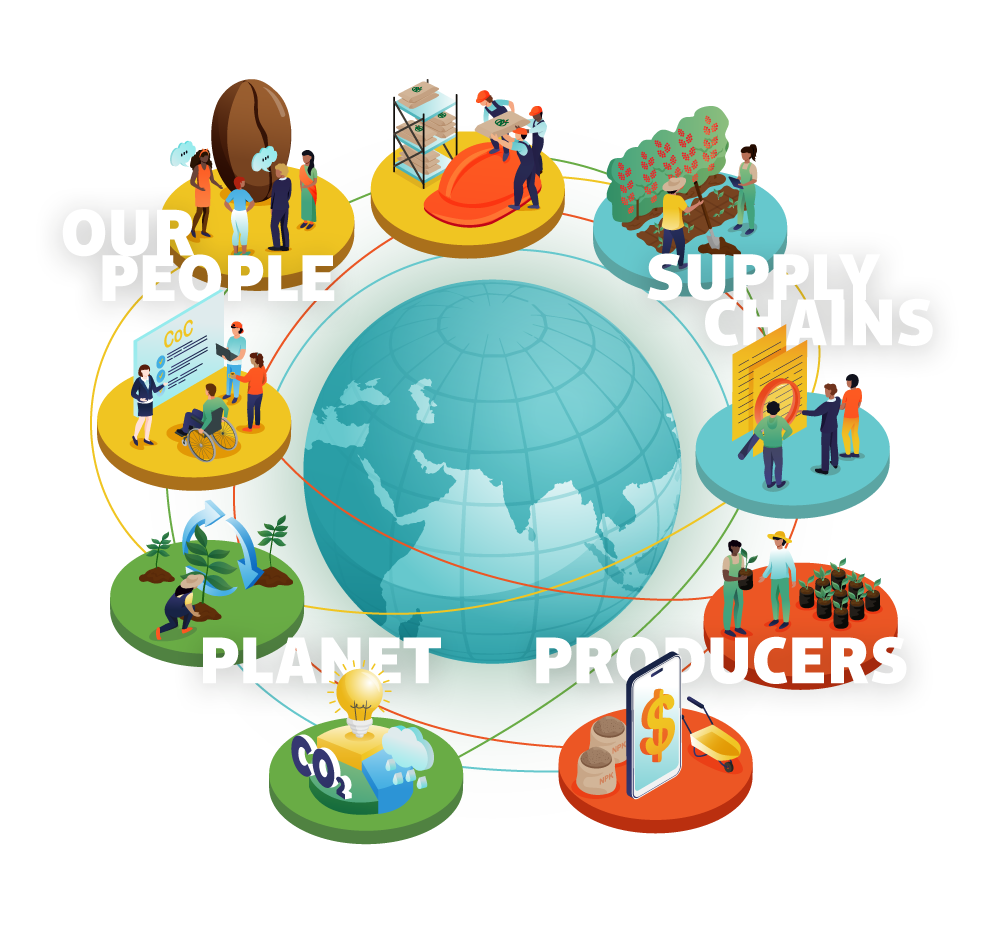Supply Chains
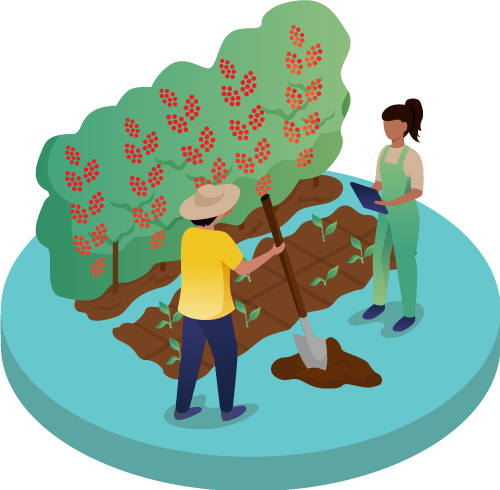
4
ENHANCE SUSTAINABILITY PERFORMANCE WITHIN OUR SUPPLY CHAINS
Through our Responsible Business Program, we are committed to maintaining ethical standards and accountability throughout our entire supply chain. Central to this commitment is NKG Verified, our responsible sourcing initiative aimed at providing traceable coffees that meet rigorous sustainability criteria. Additionally, we have been actively preparing for compliance with the European Union Regulation on Deforestation-Free Products (EUDR). In all aspects of our operations, we continually strive to find solutions that benefit both our customers and our producers in the supply chain.
NKG Verified was established in 2021 with the purpose of enhancing sustainable practices within farms and intermediaries operating in the producing country within established supply chains. Our objective is to furnish our customers with insights on NKG Verified supply chain performance, ensuring that proactive measures are undertaken to overcome any challenges. Transparency in the provenance of our NKG Verified coffee is important to us, to therefore ensure a high degree of traceability as a core element of our program.
The sustainability focus areas of NKG Verified within the different actors of the supply chains are:
Economic
Business Management, Business Integrity and Agricultural Practices
Environmental
Biodiversity Conservation, Pest and Weed Management and Resource Conservation
Social
Right to a Childhood, Human Rights and Working Conditions
For more details on sustainability criteria see Responsibly Sourced Coffees – Neumann Kaffee Gruppe (NKG)
Identifying key sustainability challenges through annual on-site audits, third-party audits every three years (sample-based), and technical visits conducted by NKG field teams is a crucial first step towards improving the sustainability of existing supply chains. These audits and visits help pinpoint areas where sustainability performance can be enhanced, including environmental impact, social practices, and economic sustainability.
In our ongoing journey, spanning over three years of dedicated effort we have reached significant milestones, including the recognition of the Global Coffee Platform (GCP) equivalence in 2023. NKG Verified is recognized by the GCP as Coffee Sustainability Reference Code equivalent – 2nd party assurance, as explained on the GCP Equivalence Mechanism – Global Coffee Platform. Likewise, NKG Verified is certified by the Brazilian Coffee Industry (Associação Brasileira da Indústria de Café) and is part of the sustainability seal “Cafés Sustentáveis do Brasil ABIC”. Beyond the credibility gained through recognition from industry organizations, a pivotal milestone for NKG Verified is the acknowledgment from producers across various origins who perceive that NKG Verified, alongside the support of NKG field teams, adds tangible value to their businesses. Our ongoing field efforts are therefore dedicated to sharing sustainability knowledge, providing services, and fostering enduring relationships with producers.
Entities in NKG Verified Supply Chains
Mara and Guilherme Romão, with their children Lara and Rafael, own a diversified NKG Verified small farm in Brazil.
“We value our partnership with Stockler and our participation in NKG Verified. This relationship goes beyond buying and selling, and we receive support and services. Their guidance on the administration and organization of our farm as a business and the support given to participate in coffee championships have been key for us.”
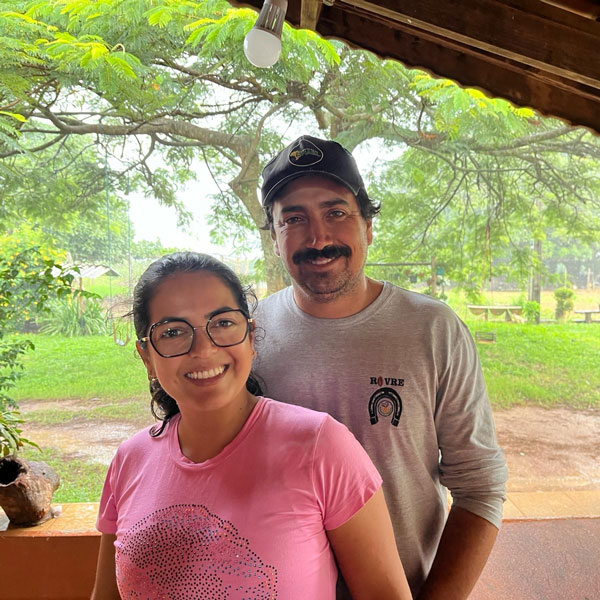
Lucio Guerra Elvir, president of the Farmer Association of Cementera Lepaera Lempira in Honduras, which has a total of 24 members and has been NKG Verified for 3 years.
“As a farmer group, we are really grateful to belong to NKG Verified because it brings us closer to high-quality technical assistance and a fair market for the farmers of our association. Additionally, it allows us to acquire knowledge that will help us manage our farms correctly and be more efficient and stable over time.”
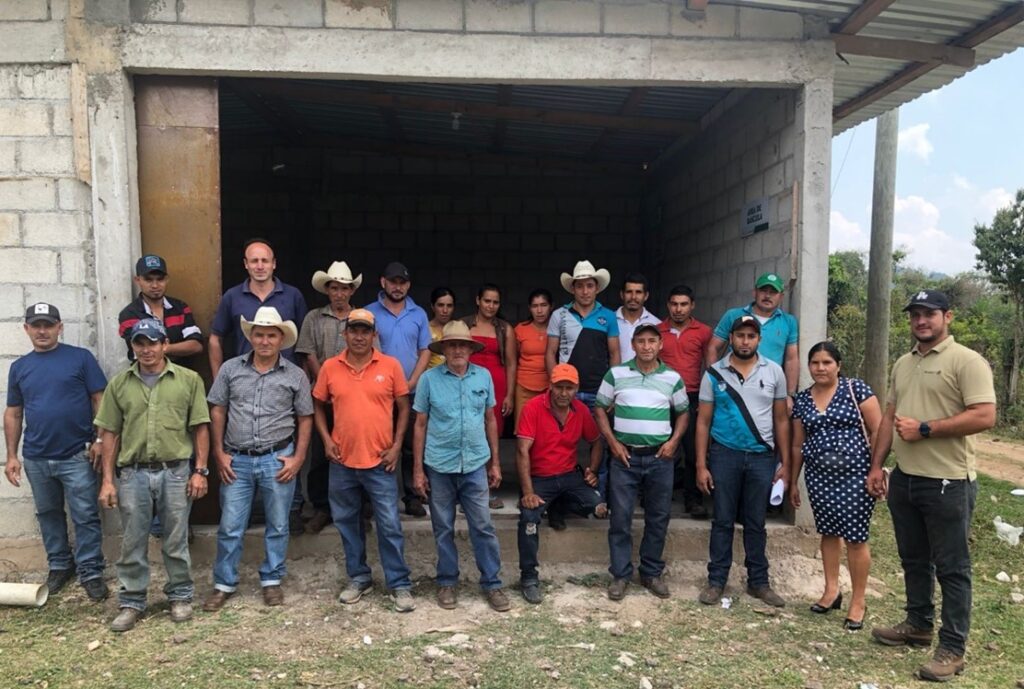
Douglas serves as Operations Coordinator at Armazéns Leste de Minas in Brazil. This facility plays a crucial role in the NKG Verified coffee supply chain, serving as a storage hub in one region before the coffee is transported to NKG’s exporting facilities.

Gustavo is one of the Sustainability Consultants at NKG exporter company in Brazil – Stockler Ltda. Gustavo and his colleagues, Giovanna and Sabrina, provide support to NKG Verified farmers in the south of Minas Gerais.
“We enjoy collaborating with coffee producers. We visit 100% of them multiple times throughout the year. Our engagement spans across both small and big farms, and we always find possibilities to contribute. By positioning ourselves as trusted partners and consultants, we’ve earned the confidence of producers in enhancing their businesses. Producers highly appreciate the opportunity to market their coffee as sustainable across various markets.”
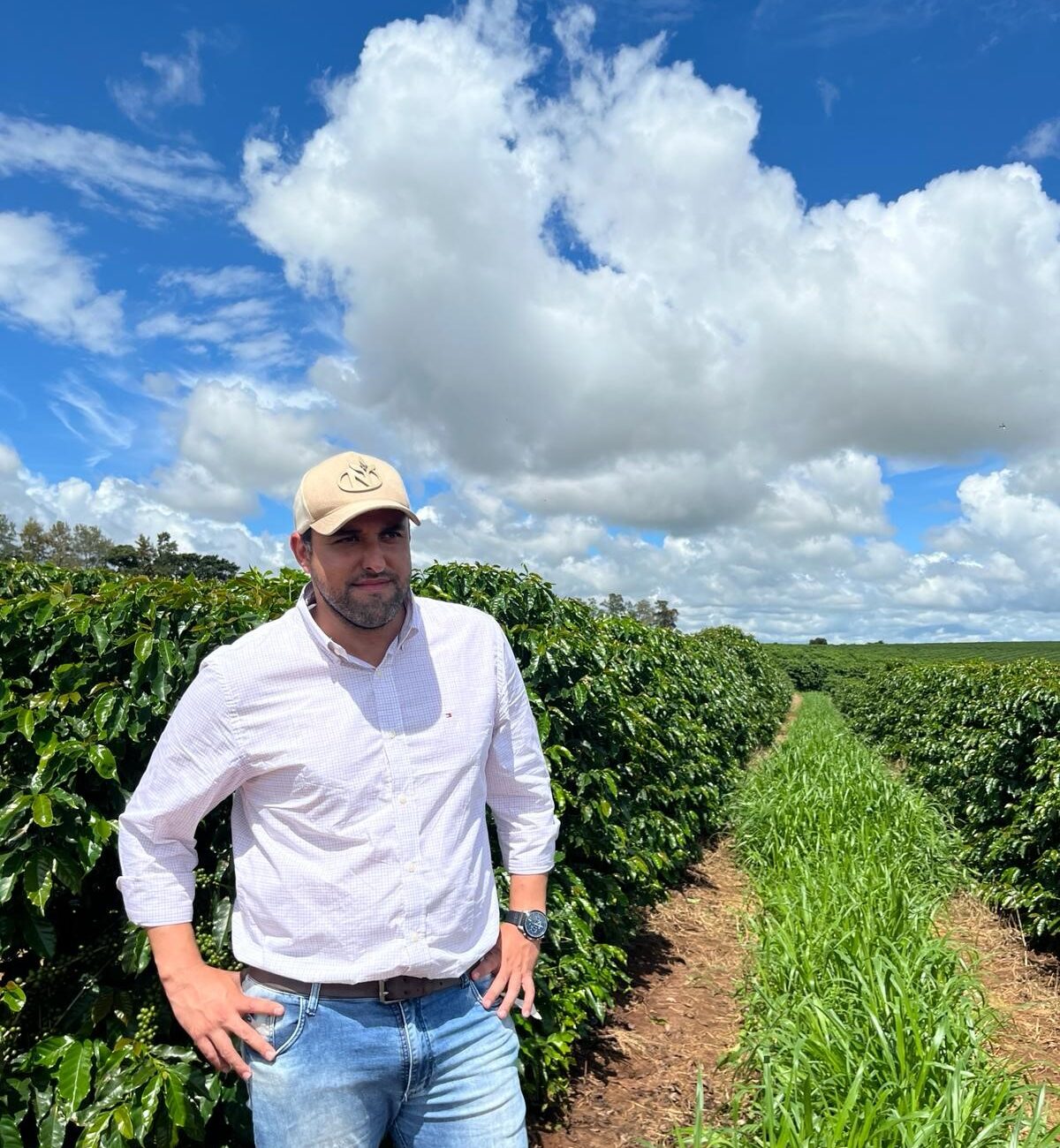
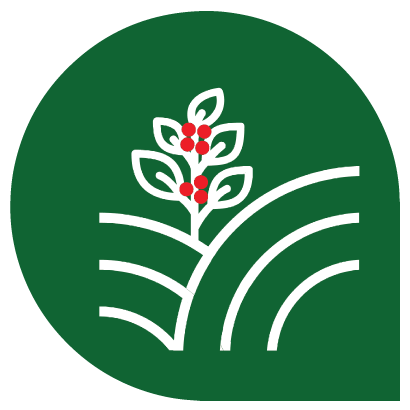

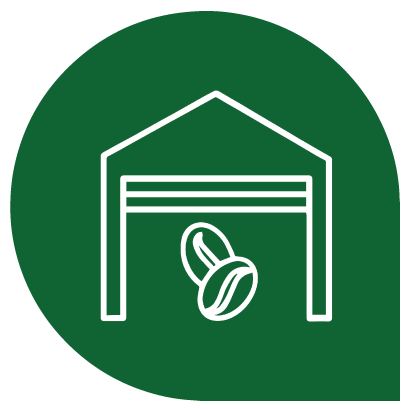
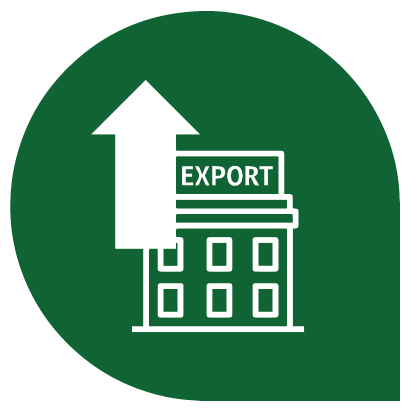
NKG Verified coffee around the world
In 2023, NKG Verified coffee became available from 10 countries, reaching over 30,000 farms, compared to nearly 13,000 farms participating in NKG Verified in 2022. This growth reflects a positive trend towards more responsible and transparent coffee production, plus more accessibility for consumers that are interested in drinking a cup of coffee from sustainable practices.
Next steps
Consolidation of existing supply chains with improved sustainability actions
After identifying the diverse sustainability challenges producers face during audits and field visits, the next steps include the implementation of tailored improvement plans. These plans entail actions to address the issues identified and improve overall sustainability performance, which are put into practice in close collaboration with our engaged staff on the ground.
Set up new NKG Verified coffee origins
With the success and increasing demand for NKG Verified coffee, there are efforts to expand the program to new coffee origins. This expansion will not only broaden the availability of sustainably and traceably sourced coffee but also provide opportunities for coffee-producing regions to improve their practices and gain recognition for their commitment to sustainability.
Continue forming partnerships to address sustainability topics
Collaboration and partnerships play a crucial role in addressing sustainability challenges specific to multiple origins and regions. By forming alliances with different stakeholders, we can work together to tackle issues such as climate change, biodiversity conservation, fair labor practices and economic development in coffee-producing regions. These partnerships enable more targeted and effective solutions tailored to the unique needs and circumstances of each origin.
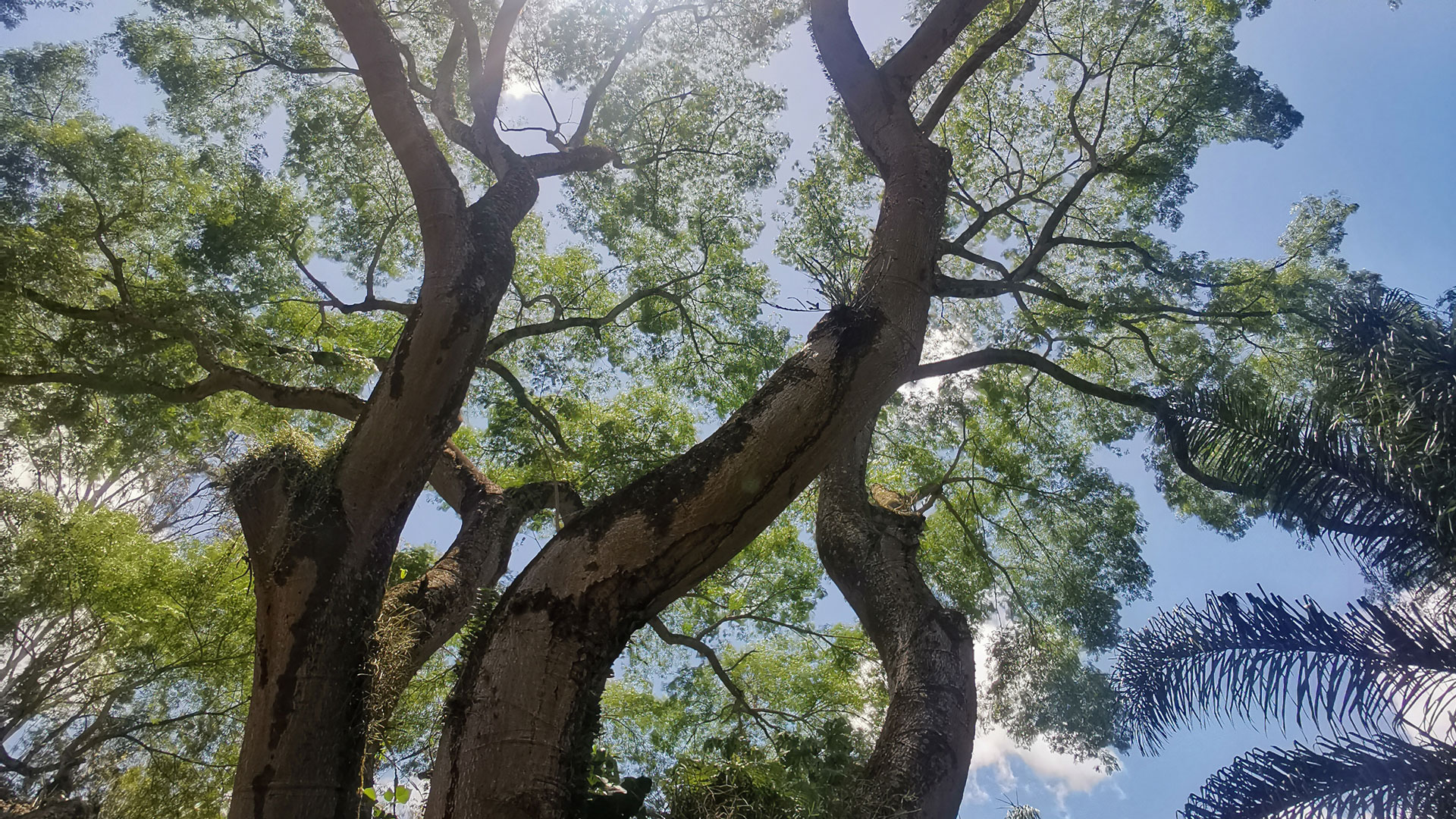
European Union Regulation on Deforestation-Free Products
On June 29, 2023, the EU Regulation on Deforestation-Free Products (EUDR) entered into force with the objective of tackling the EU contribution to global forest loss. This in turn helps mitigate greenhouse gas emissions and preserve biodiversity. Coffee as a crop is particularly vulnerable to climatic conditions. The impact of climate change is reflected in delayed harvests, crop failures due to droughts, increased disease outbreaks, or changing microclimates as a result of forest loss. It is therefore in our own interest and the interest of the 12.5 million smallholder coffee farms, globally, to act upon climate change.
EUDR in a nutshell
Coffee placed or made available on the EU market, or exported from it as of December 30, 2024, may only be produced on land that was not deforested after December 31, 2020, and in accordance with relevant national legislations. For this purpose, each EU-based operator (consignee on customs declarations) and non-SME trader (e.g. roasters or retailers) need to submit a Due Diligence statement through the EU TRACES system. Coffee considered at risk of non-compliance can be held up in customs, with coffee proven non-compliant needing to be disposed of or donated, with sanctions in case of non-compliance amounting to at least 4% of turnover, as well as further costs on the competent authority side.
The primary obstacle faced by the coffee industry in complying with the EUDR is not to prevent deforestation, as it is currently not a major concern in most coffee-growing regions. However, it is still crucial to monitor this issue as climate change causes coffee cultivation areas to shift to higher elevations, potentially encroaching on remaining forested areas. The biggest challenge lies in meeting the administrative requirements of the EUDR within a tight timeframe. These requirements involve gathering geodata, verifying the quality and deforestation-free status of coffee, enhancing traceability systems, and efficiently sharing a significant amount of data and supporting documents.
EUDR at NKG
NKG is in the best possible position to implement the EUDR, given the development of our supply chain programs: The Supply Chain Integrity Program (SCIP), NKG Verified, our service provision to smallholder coffee producers under NKG Bloom, and, above all, long-standing relationships in supply chains and our presence in producing countries with our NKG export companies. The principles guiding our actions and our expectations towards our suppliers have been established in our Supplier Code of Conduct, which is well-aligned with EUDR. All these efforts provide the basis for our NKG-wide integrated EUDR due diligence system, which is currently being set up. To do this, NKG has teamed up with osapiens, whose software will form the backbone of the due diligence system. The osapiens hub will allow our suppliers and group companies to efficiently provide information that passes through our due diligence processes and is smoothly exchanged along the supply chain. The due diligence system will ensure coherence across the group and accurate data for successful EUDR alignment for our customers.
NKG’s response to the EUDR involves ensuring a high quality of geodata, as well as conducting deforestation checks at plot level. We have developed a comprehensive and reproducible EUDR due diligence methodology, while taking legality and supply chain complexity into consideration at business partner, country, and shipment levels.
Additionally, we implement mitigative and preventative measures with direct suppliers on both country and international levels. Our setup enables us to provide direct support to producers and producer organizations via our experienced field staff on the ground, focusing on compliance and forest protection, among other factors. This enables us to ensure that the coffee from our NKG Verified program will be EUDR-aligned by the end of quarter three of this year, leading to up to 4 million bags of EUDR-aligned coffee by the end of 2024.
osapiens is a rapidly growing company with over 300 employees and 1,200 customers, including multiple DACH-region retailers. It specializes in providing holistic solutions and software for supply chain management, quality control and compliance, all rooted in traceability fundamentals. The company’s focus is on leveraging technology to enhance transparency, efficiency and traceability across supply chains. To ensure efficiency and harness economies of scale, osapiens’ solutions focus on business partners and purchase orders.
The company’s product scope extends beyond the EU Deforestation Regulation (EUDR), encompassing the German Supply Chain Act (LkSG) and the Corporate Sustainability Reporting Directive (CSRD). The osapiens hub, as the backbone for the NKG due diligence system, features an integrative design that accommodates various data sources, streamlines processes and ensures regulatory compliance. This approach allows osapiens to offer comprehensive solutions that meet a wide range of requirements.
We perceive the EUDR as an opportunity to expand our efforts, strengthen supplier relationships, enhance integrated supply chains, improve traceability and provide greater value to our clients. However, we also recognize the potential risk that this regulation could reduce origin diversity and potentially exclude unorganized smallholders from the EU market or possibly the coffee market overall. Rather than engaging in supply chains that have higher deforestation risk, more producers, and less formal structures, the EUDR may incentivize companies to work in the lowest-risk supply chains, where compliance is cheaper and the risk of non-compliance is lower.
This shift could adversely affect the 12.5 million smallholder farmers and their families who rely largely on coffee for their livelihoods. These farmers can provide positive ecosystem services such as agroforestry in buffer zones of protected areas and are the backbone of the diversity of coffee origins and cup profiles, as well as the security of future supply given climate change.
We are therefore committed to fulfilling the objectives and industry-wide increased standards established by EUDR. We call upon the coffee industry to look beyond short-term costs and toward the long-term success of our sector.
RELATED
sustainable
development
goals
